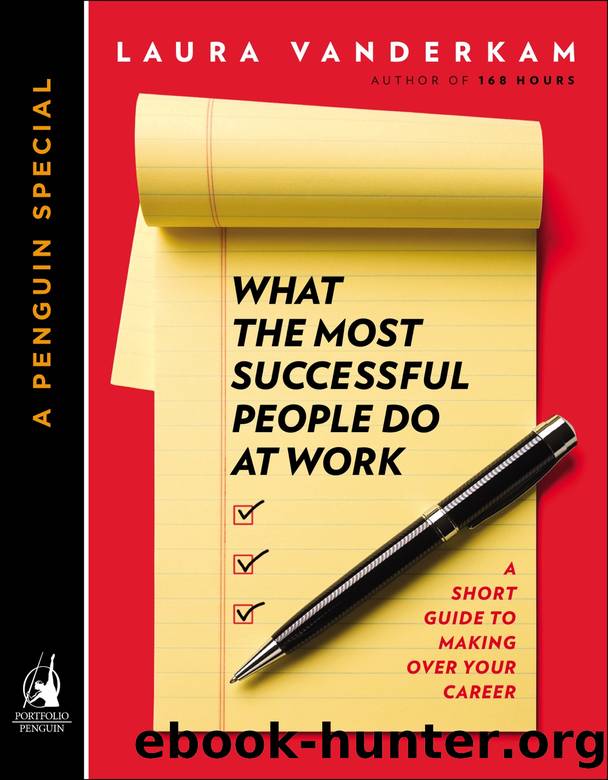What the Most Successful People Do at Work by Laura Vanderkam

Author:Laura Vanderkam [Vanderkam, Laura]
Language: eng
Format: epub
Tags: Business, Economics, Non-Fiction, Self-Help, Time Management
ISBN: 9780241966594
Google: 5sak9iv4G88C
Amazon: B00BPDR4BY
Publisher: Penguin UK
Published: 2013-04-22T23:00:00+00:00
Discipline 5
PRACTICE
Sarah Fisher has spent much of her life exceeding the speed limit. She started racing quarter midgets and karts seriously in elementary school and won her first World Karting Association Grand National Championship as a preteen. In 1999, the year she turned 19, she became the youngest woman ever to compete in the Indianapolis 500. By the time she retired in late 2010 she’d competed in that race nine times.
The regimen required to stay in peak racing form for all those years was “grueling,” she says, laughing. “I’m glad I don’t do that any more!” After spending the first half hour of the day attending to the administrative work of what became Sarah Fisher Hartman Racing, the team she founded in 2008, she’d spend 90 minutes to two hours lifting weights, running, and doing other drills with the USA Diving team, which is also headquartered in Indianapolis. In addition to working out, she’d do mental training. “Our sport is so fast, you have to have very good reaction timing,” she says, so she’d practice that. Then, after lunch, she’d come back to the shop to dive into any marketing or accounting tasks necessary to run her 25-person small business, but also to focus on other aspects of performance improvement. With race cars, “it’s not like you can fire it up and go around the block,” she says, and renting a facility and running an average test could cost $50,000–$100,000 per day. So she did a lot of simulator-based training and wind tunnel tests, and studied the data that came out of the race car. “Reviewing that data—how the car rides on the road, how it rolls, different displacement—that gives you really good feedback,” she says. If you decipher that, “you can figure out changes to make next time.”
Judging from her schedule, it seems Fisher spent around half her time as a professional driver actively trying to get better at her job. The professional musicians I’ve interviewed over the years develop similar schedules. Even as they face e-mail barrages, travel woes, and demands from their PR reps to have breakfast with reporters, they are still there at the piano, with the violin, or singing scales for hours each day. Obviously, there’s something to the old joke about how you get to Carnegie Hall.
Most people have no intention of playing on that historic stage or driving in the Indianapolis 500. Yet, if you think about it, your job is likely a performance of sorts, too. And you, too, would take your career to a new level if you spent time every day trying to improve at the tasks associated with your job.
Practice is, simply, performing or working at something repeatedly to become proficient. We do a lot of things repeatedly but seldom with the goal of improving. Unlike Fisher, “we drive almost every day, but we rarely get better at driving,” says Doug Lemov, managing director of Uncommon Schools and coauthor with Erica Woolway and Katie Yezzi of the Practice Perfect book mentioned in the section on planning.
Download
This site does not store any files on its server. We only index and link to content provided by other sites. Please contact the content providers to delete copyright contents if any and email us, we'll remove relevant links or contents immediately.
| Bookkeeping | Business Mathematics |
| Business Writing | Communications |
| Decision Making | Negotiating |
| Project Management | Running Meetings & Presentations |
| Secretarial Aids & Training | Time Management |
| Training |
Nudge - Improving Decisions about Health, Wealth, and Happiness by Thaler Sunstein(6629)
Deep Work by Cal Newport(5452)
Principles: Life and Work by Ray Dalio(5315)
The Doodle Revolution by Sunni Brown(4034)
Factfulness: Ten Reasons We're Wrong About the World – and Why Things Are Better Than You Think by Hans Rosling(4015)
Thinking in Bets by Annie Duke(3527)
Eat That Frog! by Brian Tracy(3505)
Writing Your Dissertation in Fifteen Minutes a Day by Joan Bolker(3292)
Visual Intelligence by Amy E. Herman(3278)
Hyperfocus by Chris Bailey(3259)
How to win friends and influence people by Dale Carnegie(2819)
How to Win Friends and Influence People in the Digital Age by Dale Carnegie & Associates(2814)
Schaum's Quick Guide to Writing Great Short Stories by Margaret Lucke(2797)
Hidden Persuasion: 33 psychological influence techniques in advertising by Marc Andrews & Matthijs van Leeuwen & Rick van Baaren(2771)
The Pixar Touch by David A. Price(2736)
Ogilvy on Advertising by David Ogilvy(2677)
The Slow Fix: Solve Problems, Work Smarter, and Live Better In a World Addicted to Speed by Carl Honore(2570)
Work Clean by Dan Charnas(2557)
The Content Trap by Bharat Anand(2488)
